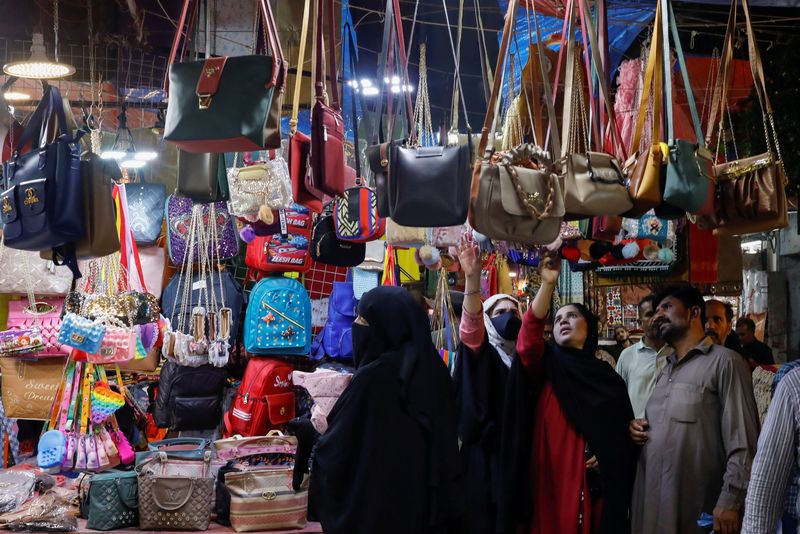By Ariba Shahid and Mubasher Bukhari
KARACHI, Pakistan (Reuters) - Retail sales in Pakistan have witnessed a sharp drop compared to previous years in the run up to the Muslim holiday of Eid al-Fitr, retailers say, as shoppers feel the pinch of decades-high inflation.
The lead up to Eid al-Fitr, expected to fall on Saturday in Pakistan to mark the end of the holy month of Ramadan, traditionally sees the highest sales of the year. But this year, the country is in the midst of a crippling economic crisis.
"There has been a 20% reduction in sales across all categories except women’s clothing," Tariq Mehboob, chairman of the Chain Store Association Pakistan (CAP) and CEO of Royal Tag, a clothing brand for men, told Reuters.
Inflation clocked in at 35% in March, fuelled by a depreciating currency, a rollback in subsidies, and the imposition of higher tariffs to secure a bailout package of $1.1 billion from the International Monetary Fund.
Food inflation has risen to more than 47%, and even the wealthier professional class is making lifestyle changes to deal with rising prices.
"Pakistanis have lost more than 50% of their wealth in the last two years in the form of depreciation, so you’re now selling to people with 50% less available funds, while the cost has gone up 100%,” said Asad Shafi, owner of female clothing brand Cross Stitch.
"The expectation of fashion retailers is so low that even meeting breakeven or bare minimum sales just to stay alive is acceptable," he added.
Asfandyar Farrukh, co-founder of CAP and managing director of Hub, a leather goods store, said that Eid shopping appears to have started sooner and peaked earlier, coinciding with salary pay days, and customers anticipating price increases.
"Established brands are not seeing as big a drop in revenues as local markets as they are frequented more by upper-middle and upper-income customers," says Farrukh.
Usually bustling markets and shopping centres targeting the middle and lower middle class such as Anarkali and Liberty Market in the eastern city of Lahore have both reported fewer customers.
Ashraf Bhatti, president of the Anarkali Traders Association, told Reuters that there had been a 50% reduction in Eid shopping this year, while Sohail Sarfaraz Mani, President of Liberty Market Traders Association, estimated the drop had been around 35%.

The sales drop adds to the slowing of Pakistan's $350 billion economy, which has struggled in recent months amidst tough stabilisation polices, including the central bank raising interest rates to a historic high of 21%.
Pakistan expects its economy to grow 2% during the current fiscal year; however, in April, the World Bank slashed Pakistan's growth projections from 2% to 0.4%.